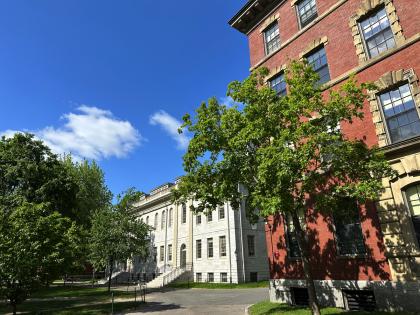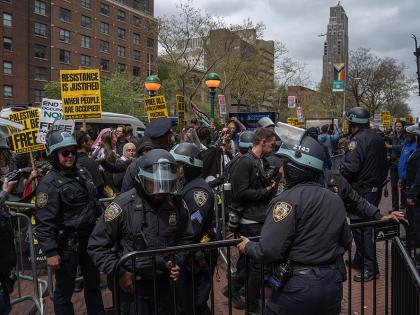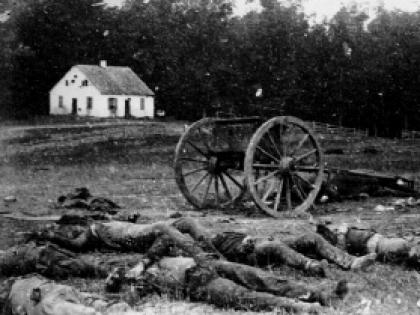Undergraduates expressed grave concerns about the widespread nonconsensual sexual contact on campus reported in a survey released on September 21, and about a potential disconnect between Harvard’s administration and students—issues that surfaced quickly following publication of findings from the survey conducted last spring.
Students interviewed described the results as “awful” and “saddening”—but not surprising. “The fact that anyone would be completely shocked by the data is a warning sign that not enough students’ voices were being heard,” said Drisana Mosaphir ’17, an organizer of the advocacy group Our Harvard Can Do Better, which was involved in the filing of a 2014 Title IX complaint against Harvard with the U.S. Department of Education’s Office for Civil Rights.
Students found it particularly troubling that female undergraduates at Harvard are less likely to believe that campus officials would take a report of abuse seriously, conduct a fair investigation, or take action against an offender than are the full set of students surveyed at 27 institutions nationwide. “There is a general perception in the student body that the administration has not and perhaps will not take an active role in things like sexual assault and mental health,” said William Morris IV ’17. “I almost see an ‘us versus them’ mentality between the two.” This lack of faith in the University discourages victims from seeking help, and may “send a message of impunity to perpetrators,” said Hope Patterson ’17.
For Jessica Fournier ’17, another organizer of Our Harvard Can Do Better, students’ distrust in the administration is the direct result of the “lack of transparency” in the way sexual-assault cases are handled at the University. Although there have been numerous open meetings and working groups on the issue, she said, students were not involved in effecting actual changes to the sexual-assault policy, which they maintain is written in opaque language and communicated to undergraduates only once during their freshmen year. Members of the Task Force on the Prevention of Sexual Assault include three students, Fournier added, which is “simply not enough.”
On Monday evening, President Drew Faust held an open meeting in the Science Center, attended by several hundred interested members of the Harvard community. Following a presentation of the survey results by Goldman professor of economics David Laibson, a task-force member who helped design the survey instrument, Faust and other administrators responded to questions and concerns from the audience. She acknowledged that the University’s current measures intended to address the prevalence of sexual assault are “completely insufficient,” though she repeatedly emphasized that improving the situation is a collective responsibility of all members of the Harvard community, not just the administrators.
One concern echoed by many audience members was the lack of safe, supervised social spaces for College students, which some say have led to a greater demand for unrecognized social groups on campus, such as final clubs. According to the survey results, 15 percent of incidents of attempted or completed penetration take place in “single-sex organizations that are not fraternities or sororities.” Laibson said that this category is intended to refer to final clubs. “We could not refer to ‘final clubs’ on this particular question, but we could use language that, in our mind, would evoke final clubs disproportionately for our students,” he explained during the open meeting. He added that he sees this finding as an “alarm bell,” considering that final clubs are non-residential spaces, and that only a small proportion of the student body is affiliated with them.
On the other hand, students interviewed said they were surprised that the percentage of incidents that take place in final clubs is so low. “With all the negative attention final clubs are receiving for their role in creating potentially unsafe spaces, I would have expected a larger proportion of assaults to have occurred there,” Patterson said. “It clearly shows that the University must do more to combat sexual violence than blame final clubs and other unrecognized single-sex organizations.”
In response to a question on whether the College will consider recognizing final clubs, College dean Rakesh Khurana did not directly address the issue, but told students that “the world is co-ed,” and any organization, recognized or unrecognized, that recruits Harvard students has to be “in synchronization with the mission of the College.”
Faust promised that Monday’s session will be the “beginning, not the end” of a series of open dialogues between administrators and students on the issue. William Oh ’18, who attended the meeting, said he found it much more productive than he expected. “Having President Faust answering questions was really helpful,” he said. “I hope this is not a singular moment and this will be continued.”
Morris said he is glad to see that the University is finally making sexual assault a priority, and hopes that this momentum will be sustained. “There are a lot of things on this campus that just go away,” he said. “I don’t want sexual assault to just go away. I don’t want mental health to just go away. I want people on campus to keep on pushing these issues until the administration gives in.”









